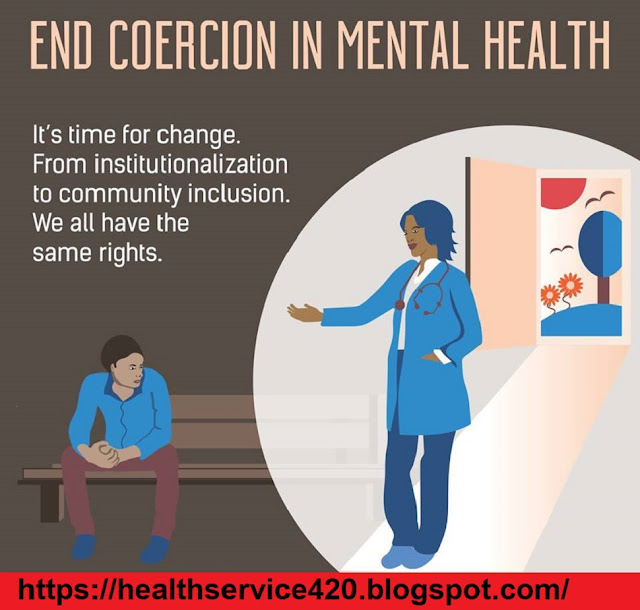Secluding, physically restraining or overmedicating individuals experiencing mental health crises still happen, however, countries around the world are trialing palmy alternatives.
End enforcement in mental health and solution
By prof Bernadette McSherry and Dr. Piers Gooding, University of Melbourne
Controlling the behavior of individuals experiencing mental health crises by buirdly them into beds or chairs or overmedicating them could seem like one thing that might happen elsewhere or within the past.
Yet it typically happens here in Australia in 2018, and will even be permitted below mental health laws.
While most Australians UN agency expertise mental health conditions will get assistance on a voluntary basis, the legislation will provide people with severe mental health conditions to be obligatorily detained and treated - notwithstanding their desires.
Unsurprisingly, once treatment while not consent is combined with closed environments, powerful practices, and human rights abuses will become the norm.
Consider Henry Martyn Robert Spriggs, as an example. His story emerged throughout inquiries into practices at the Oakden Older Persons mental health Service in South Australia
Shortly once being admitted to Oakden in 2015, the 66-year-old man Spriggs was taken to Royal state capital Hospital with vital and unexplained bruising on his hip and thighs.
His family later learned he had been given five hundred milligrams of the anti-psychotic drug Seroquel, rather than the prescribed fifty milligrams. The bruising was possibly caused by his being strapped to a chair.
South Australia’s Chief medical specialist issued a damnatory report, inform to the “ongoing and continual use” of practices like buirdly people into chairs and overmedicating them in ways in which were “likely enforced for employees convenience and or used as punishment”.
The scandal conjointly gave rise to a report by South Australia’s freelance Commissioner Against Corruption and also the Senate Community Affairs Reference Committee.
How DO alternative COUNTRIES forestall powerful PRACTICES IN mental health CARE?
Our analysis examines the ways in which avoiding powerful practices to make sure folks experiencing mental state crises area unit treated with dignity and respect.
Most recently, we have a tendency to undertook a scientific review of worldwide practices that aim to cut back, forestall, and finish powerful practices in mental health settings.
The review was commissioned by the United Nations office in Geneva. it'll inform a report of the world organization Special recorder on the Rights of Persons with Disabilities, whose role is to push the human rights of persons with disabilities worldwide.
We found that once governments, service-providers, courts, and communities take united action to maneuver faraway from powerful practices, they're nearly always palmy.
While practices like seclusion, physical force, mistreatment belts or straps to limit movement or medication to regulate behavior are arguably even in extreme circumstances to stop damage to the person or to others, in line with a World Health Organization report, they're counter-therapeutic.
Coercive practices will impede people’s recovery and re-traumatize those that have antecedently skilled sexual and physical abuse.
We needed to understand whether or not they may be avoided altogether and that we found several examples from around the world wherever they're.
In Holland, as an example, a national policy that aimed to cut back rates of seclusion in mental health settings reportedly resulted in a median reduction of yearly seclusion incidents by 9 percent.
In China, a national policy designed to prevent folks with mental state conditions from being ‘shackled’ in family homes and villages, reportedly had a ninety-two percent success rate.
Within hospitals, the Six Core ways to cut back the utilization of Seclusion and Restraint is outstanding and has been with success applied within u. s., Canada, Australia, and New Zealand.
The initiative includes strategic use of information, leadership, men development, service user roles in inpatient settings, and also the use of targeted tools to cut back incidents of restraint and seclusion in mental state settings.
Some practices were semiconductor diode by folks that have themselves used mental health services. an Australian study, as an example, checked out an initiative in a very hospital within the national capital Territory wherever the Six Core ways were applied. Seclusion incident rates reportedly fell from vi.9 percent too but one percent over a biennial amount.
Other countries, like New Zealand, u. s. and FRG, have seen the proliferation of service user-led crisis respite homes, with promising results.
Some sudden findings emerged from the review.
Certain assumptions in mental health care follow were challenged, like the notion that psychiatric wards got to be fastened. This assumption is predicated on a belief that fastened doors forestall folks from absconding, making an attempted suicide, or dying by suicide.
German researchers UN agency examined around 350,000 admissions to twenty-one hospitals over a 15-year amount, complete that “there is shy proof that treatment on fastened wards will effectively forestall these outcomes”.
In fact, their analysis suggests the alternative. Open wards were related to a cut chance of suicide makes an attempt, absconding with come, and absconding while not come. However, open wards didn't seem to have an effect on rates of death by suicide.
An Italian study reported on an “open door… no restraint system of look after recovery and citizenship” within the town of Trieste. in line with the author, Trieste’s mental state system “changed from a clinical model supported treating unwellness to a wider construct of mental health that appears at the full person and [his or her] social background”.







.png)





0 Comments
thanks for connecting me, I will back to you as soon as possible